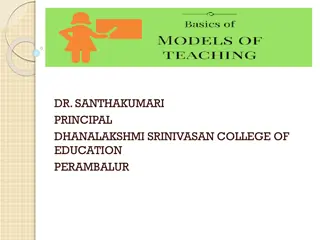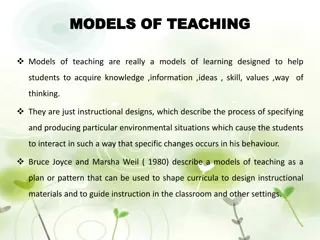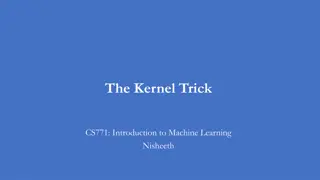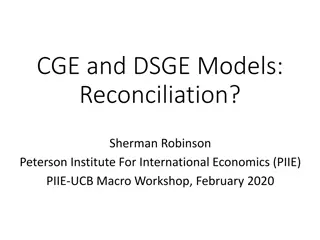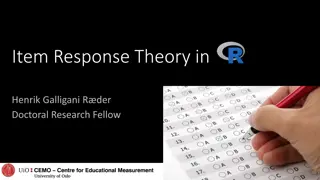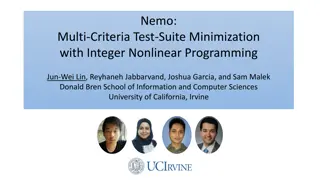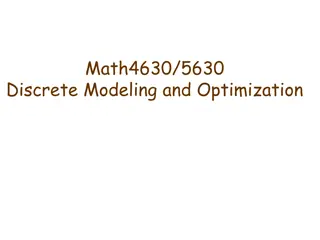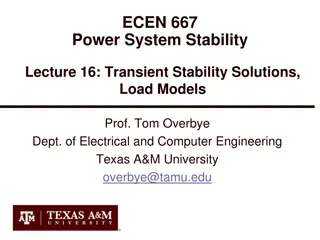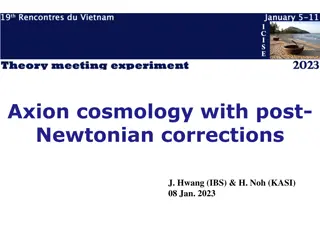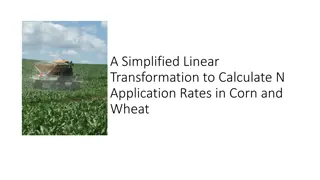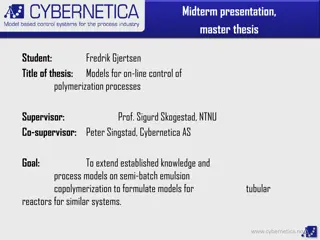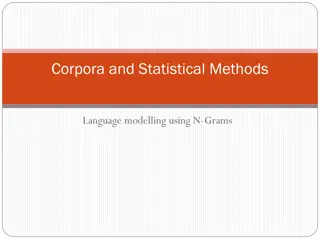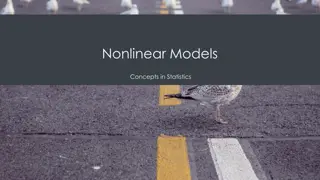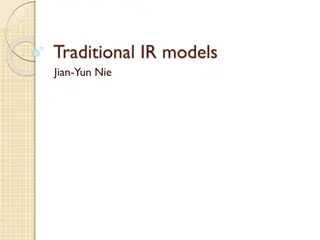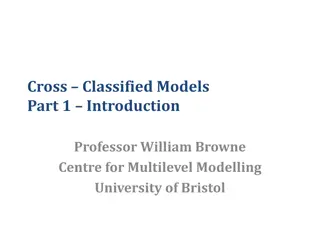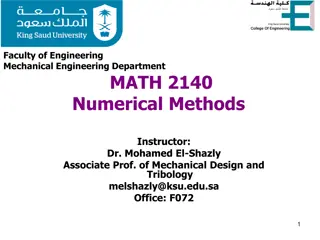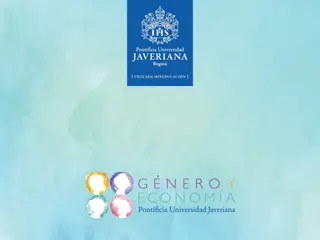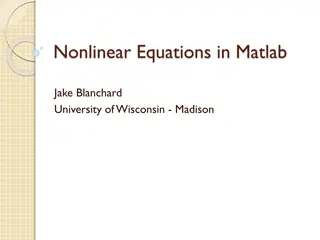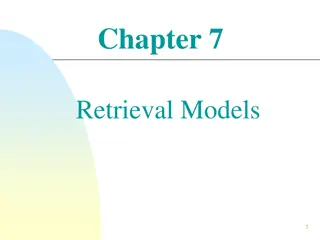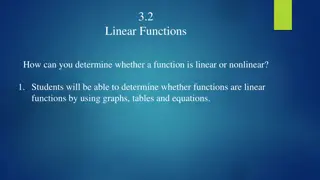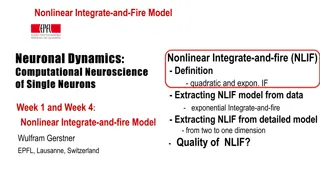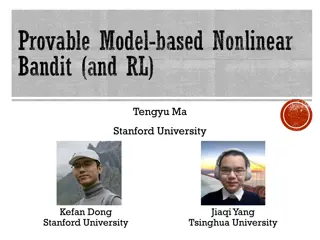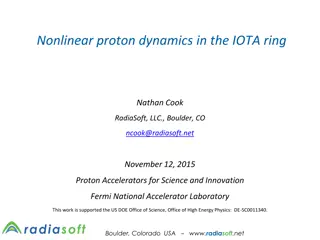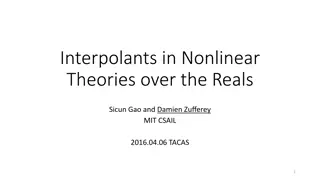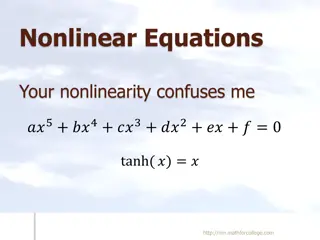Global Climate Models
Scientists simulate the climate system and project future scenarios by observing, measuring, and applying knowledge to computer models. These models represent Earth's surface and atmosphere using mathematical equations, which are converted to computer code. Supercomputers solve these equations to pr
3 views • 15 slides
System Models in Software Engineering: A Comprehensive Overview
System models play a crucial role in software engineering, aiding in understanding system functionality and communicating with customers. They include context models, behavioural models, data models, object models, and more, each offering unique perspectives on the system. Different types of system
2 views • 33 slides
Understanding Input-Output Models in Economics
Input-Output models, pioneered by Wassily Leontief, depict inter-industry relationships within an economy. These models analyze the dependencies between different sectors and have been utilized for studying agricultural production distribution, economic development planning, and impact analysis of i
8 views • 7 slides
Process integration and optimization
Understanding Nonlinear Programming (NLP) models involves dealing with difficult optimization problems where optimal solutions may not be at corner points, and both local and global solutions are possible. This lecture at Addis Ababa University delves into the challenges and nuances of NLP models, h
8 views • 24 slides
Generalized Additive Models
Generalized Additive Models (GAMs) provide a flexible and automatic statistical method for identifying and characterizing nonlinear regression effects. Unlike traditional linear models, GAMs can capture non-linear relationships between predictors and outcomes using unspecified smooth functions. By f
0 views • 52 slides
Exploring Nonlinear Relationships in Econometrics
Discover the complexities of nonlinear relationships through polynomials, dummy variables, and interactions between continuous variables in econometrics. Delve into cost and product curves, average and marginal cost curves, and their implications in economic analysis. Understand the application of d
1 views • 34 slides
Understanding Models of Teaching in Education
Exploring different models of teaching, such as Carroll's model, Proctor's model, and others, that guide educational activities and environments. These models specify learning outcomes, environmental conditions, performance criteria, and more to shape effective teaching practices. Functions of teach
2 views • 20 slides
Understanding Models of Teaching for Effective Learning
Models of teaching serve as instructional designs to facilitate students in acquiring knowledge, skills, and values by creating specific learning environments. Bruce Joyce and Marsha Weil classified teaching models into four families: Information Processing Models, Personal Models, Social Interactio
1 views • 28 slides
Understanding the Power of Nonlinear Models in Machine Learning
Delve into the limitations of linear models for handling nonlinear patterns in machine learning. Explore how nonlinear problems can be effectively addressed by mapping inputs to higher-dimensional spaces, enabling linear models to make accurate predictions. Discover the significance of feature mappi
0 views • 15 slides
Significance of Models in Agricultural Geography
Models play a crucial role in various disciplines, including agricultural geography, by offering a simplified and hypothetical representation of complex phenomena. When used correctly, models help in understanding reality and empirical investigations, but misuse can lead to dangerous outcomes. Longm
0 views • 8 slides
Understanding CGE and DSGE Models: A Comparative Analysis
Explore the similarities between Computable General Equilibrium (CGE) models and Dynamic Stochastic General Equilibrium (DSGE) models, their equilibrium concepts, and the use of descriptive equilibria in empirical modeling. Learn how CGE and DSGE models simulate the operation of commodity and factor
4 views • 15 slides
Enhancing Information Retrieval with Augmented Generation Models
Augmented generation models, such as REALM and RAG, integrate retrieval and generation tasks to improve information retrieval processes. These models leverage background knowledge and language models to enhance recall and candidate generation. REALM focuses on concatenation and retrieval operations,
1 views • 9 slides
Understanding Item Response Theory in Measurement Models
Item Response Theory (IRT) is a statistical measurement model used to describe the relationship between responses on a given item and the underlying trait being measured. It allows for indirectly measuring unobservable variables using indicators and provides advantages such as independent ability es
2 views • 32 slides
Multi-Criteria Test Suite Minimization with Integer Nonlinear Programming
The study introduces a method for minimizing test suites using Integer Nonlinear Programming. It addresses regression testing challenges, such as managing large numbers of test cases, through Multi-Criteria Test Suite Minimization (MCTSM). The research explores the application of Integer Programming
0 views • 34 slides
Understanding Discrete Optimization in Mathematical Modeling
Discrete Optimization is a field of applied mathematics that uses techniques from combinatorics, graph theory, linear programming, and algorithms to solve optimization problems over discrete structures. This involves creating mathematical models, defining objective functions, decision variables, and
0 views • 12 slides
Power System Stability Lecture: Transient Solutions and Load Models
This lecture delves into transient stability solutions and load models in power systems. It covers the simultaneous implicit method for solving algebraic and differential equations, focusing on the Trapezoidal approach for linear systems. The discussion extends to nonlinear cases, particularly using
0 views • 47 slides
Observational Constraints on Viable f(R) Gravity Models Analysis
Investigating f(R) gravity models by extending the Einstein-Hilbert action with an arbitrary function f(R). Conditions for viable models include positive gravitational constants, stable cosmological perturbations, asymptotic behavior towards the ΛCDM model, stability of late-time de Sitter point, a
1 views • 12 slides
Understanding Wireless Propagation Models: Challenges and Applications
Wireless propagation models play a crucial role in characterizing the wireless channel and understanding how signals are affected by environmental conditions. This article explores the different propagation mechanisms like reflection, diffraction, and scattering, along with the challenges and applic
1 views • 14 slides
Understanding Axion Cosmology with Post-Newtonian Corrections
Exploring axion cosmology with post-Newtonian corrections, this study delves into linear density perturbations for dust, the role of axion as a cold dark matter candidate, and fully nonlinear perturbation formulations. It addresses continuity, momentum conservation, and quantum stress to identify ke
0 views • 22 slides
Simplified Linear Transformation for N Application Rates in Corn and Wheat
Dr. Brenda Ortiz and Dr. Bill Raun led an investigation on predicting grain yield using optical sensors in corn and wheat. The challenges with the symmetric sigmoid model for yield prediction led to the development of a simplified linear transformation approach. Assumptions were made to create a mod
0 views • 28 slides
Models for On-line Control of Polymerization Processes: A Thesis Presentation
This presentation delves into developing models for on-line control of polymerization processes, focusing on reactors for similar systems. The work aims to extend existing knowledge on semi-batch emulsion copolymerization models, with a goal of formulating models for tubular reactors. Strategies, ba
0 views • 16 slides
Understanding N-Gram Models in Language Modelling
N-gram models play a crucial role in language modelling by predicting the next word in a sequence based on the probability of previous words. This technology is used in various applications such as word prediction, speech recognition, and spelling correction. By analyzing history and probabilities,
0 views • 101 slides
Understanding Nonlinear Models in Statistics
Nonlinear models in statistics focus on exploring nonlinear relationships between quantitative variables. This involves defining exponential growth and decay, analyzing population data trends like the dramatic turnaround of bald eagles after the ban on DDT, and determining when linear models may not
0 views • 21 slides
Understanding Information Retrieval Models and Processes
Delve into the world of information retrieval models with a focus on traditional approaches, main processes like indexing and retrieval, cases of one-term and multi-term queries, and the evolution of IR models from boolean to probabilistic and vector space models. Explore the concept of IR models, r
0 views • 65 slides
Understanding Cross-Classified Models in Multilevel Modelling
Cross-classified models in multilevel modelling involve non-hierarchical data structures where entities are classified within multiple categories. These models extend traditional nested multilevel models by accounting for complex relationships among data levels. Professor William Browne from the Uni
0 views • 13 slides
Nonlinear Curve Fitting Techniques in Engineering
Utilizing nonlinear curve fitting techniques is crucial in engineering to analyze data relationships that are not linear. This involves transforming nonlinear equations into linear form for regression analysis, as demonstrated in examples and methods such as polynomial interpolation and exponential
0 views • 18 slides
Understanding General Equilibrium Models and Social Accounting Matrices
General Equilibrium Models (CGE) and Social Accounting Matrices (SAM) provide a comprehensive framework for analyzing economies and policies. This analysis delves into how CGE models help simulate various economic scenarios and their link to SAM, which serves as a key data input for the models. The
0 views • 50 slides
Solving Nonlinear Equations in Matlab: A Comprehensive Guide
Explore the process of solving nonlinear algebraic equations using fzero and fsolve commands in Matlab. Understand the potential for no solution or multiple solutions, and learn how to convert equations into functions, define the functions, call the solver, and run the full code to find the roots of
0 views • 9 slides
Understanding Retrieval Models in Information Retrieval
Retrieval models play a crucial role in defining the search process, with various assumptions and ranking algorithms. Relevance, a complex concept, is central to these models, though subject to disagreement. An overview of different retrieval models like Boolean, Vector Space, and Probabilistic Mode
0 views • 56 slides
Neural Network Control for Seismometer Temperature Stabilization
Utilizing neural networks, this project aims to enhance seismometer temperature stabilization by implementing nonlinear control to address system nonlinearities. The goal is to improve control performance, decrease overshoot, and allow adaptability to unpredictable parameters. The implementation of
0 views • 24 slides
Determining Linearity of Functions Through Graphs, Tables, and Equations
Students learn to distinguish between linear and nonlinear functions by examining graphs, tables, and equations. Linear functions exhibit constant rates of change, represented by straight lines, while nonlinear functions lack a constant rate of change, leading to curved or non-linear graph shapes. B
0 views • 11 slides
Understanding Composite Models in Building Complex Systems
Composite models are essential in representing complex entities by combining different types of models, such as resource allocation, transport, and assembly models. Gluing these models together allows for a comprehensive representation of systems like the milk industry, where raw materials are trans
0 views • 27 slides
Understanding Nonlinear Integrate-and-Fire Models in Neuronal Dynamics
Exploring the Nonlinear Integrate-and-Fire (NLIF) model in computational neuroscience, including its definition, the quadratic and exponential IF variations, and methods for extracting NLIF models from data and detailed neuronal models. Gain insights into the complex dynamics of single neurons throu
0 views • 32 slides
Challenges in Model-Based Nonlinear Bandit and Reinforcement Learning
Delving into advanced topics of provable model-based nonlinear bandit and reinforcement learning, this content explores theories, complexities, and state-of-the-art analyses in deep reinforcement learning and neural net approximation. It highlights the difficulty of statistical learning with even on
0 views • 23 slides
Nonlinear Proton Dynamics in the IOTA Ring: Advancements in Beam Acceleration
Probing the frontier of proton acceleration, this research delves into nonlinear dynamics within the IOTA ring, showcasing integrable optics and innovative technologies. Collaborations with Fermilab drive advancements in accelerator science, supported by the US DOE. The study explores variational as
0 views • 21 slides
Interpolants in Nonlinear Theories: A Study in Real Numbers
Explore the application of interpolants in nonlinear theories over the real numbers, delving into topics such as reasoning about continuous formulae, Craig interpolation, and branch-and-prune strategies. Discover how nonlinear theories can be both undecidable and decidable with perturbations, captur
0 views • 20 slides
Solving Nonlinear Equations in Engineering Problems
Explore practical applications of solving nonlinear equations in engineering scenarios, including finding submersion depth of floating balls, determining fluid temperatures, and calculating mast height for structural stability. Engage with examples and visuals to enhance your understanding of nonlin
0 views • 38 slides
Understanding Nonlinear Optical Processes in Semiconductors
Exploring the complexities of nonlinear optics in the perturbative and non-perturbative regimes, this research delves into the generation of harmonics, optical Kerr effects, and extreme nonlinear optical phenomena utilizing phase-controlled electromagnetic pulses. The work also investigates the inte
0 views • 15 slides
Understanding Linear and Nonlinear Functions in Mathematics
Explore the concepts of linear and nonlinear functions in mathematics through identifying linear and nonlinear functions from graphs, understanding the characteristics of linear functions, and identifying linear functions from tables. Learn about the constant rate of change, slope, and how to determ
0 views • 49 slides
Chloroprene Rubber Compression Test Using COMSOL
Elastomers and biological materials exhibit strain rate dependent mechanical behavior and hysteresis when subjected to cyclical loads. This example demonstrates the use of the Polymer Viscoplasticity feature in the Nonlinear Structural Materials Module for modeling such phenomena using the Bergstrom
0 views • 8 slides






